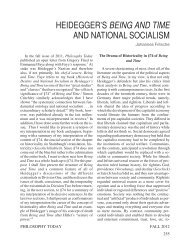SPINOZA'S VIRTUOUS PASSIONS
SPINOZA'S VIRTUOUS PASSIONS
SPINOZA'S VIRTUOUS PASSIONS
Create successful ePaper yourself
Turn your PDF publications into a flip-book with our unique Google optimized e-Paper software.
778 MATTHEW J. KISNER<br />
sively, because it provides us with only inadequate ideas, cannot contribute<br />
to the highest good. 46<br />
Would the passions count as virtuous in the sense of true virtue?<br />
It is tempting to answer no, since true virtue involves acting from adequate<br />
ideas and the passions are inadequate ideas. However, we must<br />
remember that true virtue implies living in accordance with reason, in<br />
other words, consistently acting in ways which increase our power of<br />
activity. Since the passions serve as a barometer of our power, they<br />
would help us to increase our power by indicating whether an activity<br />
increases our power. For instance, my formative experiences with<br />
the painful consequences of breaking rules taught me that a life of<br />
crime will not assist my perfection, whereas the pleasure accompanying<br />
learning taught me that a life of education would. Indeed, there is<br />
a good case for thinking of the passions as necessary for true virtue.<br />
While one may occasionally get lucky and hit on the right action, it is<br />
unlikely that one would consistently act appropriately without the<br />
feedback offered by the passions. Since it can be difficult to tell<br />
whether one is acting in accordance with reason, one needs to know<br />
when she succeeds and fails. This sort of feedback cannot come from<br />
adequate ideas, since they are too general. For instance, while we can<br />
determine through adequate ideas that we should surround ourselves<br />
with rational people and love God, the actual pursuit of these activities<br />
requires us to know more specific, particular things than can be<br />
revealed through adequate ideas. For instance, I need to know which<br />
people are rational or whether my love for a particular person is leading<br />
me towards love of God or mere lust. Making these determinations<br />
requires experience, in particular, the experience of increasing<br />
or decreasing one’s power, which is revealed only by the passions.<br />
The foregoing argument presupposes that the passions provide a<br />
kind of intelligence, that one can tell from pleasure or pain the status<br />
of one’s power. A possible problem with this claim is that Spinoza admits<br />
that some pleasures can be bad and some pains good. If a pleasure<br />
is bad, it decreases my perfection. But pleasure is supposed to<br />
indicate an increase in my perfection; “pleasure is not in itself bad, but<br />
46<br />
As a side note, this point provides a possible explanation for those<br />
passages where Spinoza seems to contrast virtue to passions, saying, for instance,<br />
that humility “is not a virtue, but a passion” (4p53d): by ‘virtue’ here,<br />
the suggestion goes, Spinoza means something like “contributes to the highest<br />
good.”
















